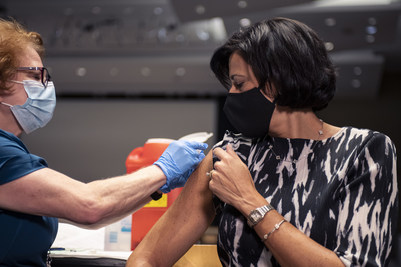NFID survey: 44% of U.S. adults are unsure or don’t plan to get flu vaccine this year

Rochelle. P. Walensky, MD, MPH, Director of the Centers for Disease Control and Prevention (CDC), receives an influenza (flu) vaccination. Speaking at a National Foundation for Infectious Diseases (NFID) news conference, Dr. Walensky urged everyone age 6 months and older to get vaccinated against flu annually. Image courtesy of NFID.

New data released Oct. 7 by the National Foundation for Infectious Diseases (NFID) showed that 44% of U.S. adults are unsure or do not plan to get vaccinated against influenza (flu) during the 2021-2022 flu season. Of further concern, the survey found that nearly 1 in 4 (23%) who are at higher risk for flu-related complications said they were not planning to get vaccinated this season. At a news conference, representatives from NFID and other leading public health and medical organizations, including Centers for Disease Control and Prevention (CDC) Director Rochelle P. Walensky, MD, MPH, urged everyone age 6 months and older to get vaccinated against flu annually.
“While we do not know what flu activity will be like this fall—I urge everyone age 6 months and older to get vaccinated. If you are unsure about getting a flu vaccine, please take the time to get the information you need to make the right choice for your health and to get vaccinated. The COVID-19 pandemic is not over, and the risk of both flu and COVID-19 circulating could put additional strain on hospitals and frontline healthcare professionals,” said Dr. Walensky. “Getting vaccinated against flu is the best way that everyone can protect themselves and their loved ones against flu and help reduce additional demands on our healthcare system.”
“While flu activity was historically low during the 2020-2021 flu season, we could see flu activity surge this season, with relaxed COVID-19 mitigation strategies, increased travel, and the reopening of schools and businesses,” said NFID Medical Director William Schaffner, MD. “The best way to protect yourself against flu is to get an annual flu vaccine. Even in cases when flu vaccination does not completely prevent infection, it can reduce the duration and severity of illness and can help prevent serious complications, including hospitalization and death.”
The NFID annual survey on attitudes and behaviors around flu, pneumococcal disease, and COVID-19 also revealed that among adults age 65 years and older, or those with an underlying health condition who are at higher risk for pneumococcal disease, 51% are not familiar with pneumococcal disease and only about a third (32%) report that they have been advised to get vaccinated against pneumococcal disease. “Flu season is a great time to make sure you are up to date on pneumococcal vaccination, as pneumococcal disease can be a serious complication of flu,” said Dr. Schaffner.
The NFID survey found that 37% of adults are very or extremely worried about COVID-19 (for themselves or someone in their family), but only 19% are similarly concerned about flu. Hispanic adults (52%) and Black adults (45%) are more likely to be worried about contracting both flu and COVID-19 at the same time compared with White adults (27%).
Dr. Walensky and Dr. Schaffner were joined at the news conference by Laura E. Riley, MD, obstetrician and gynecologist-in-chief, NewYork-Presbyterian/Weill Cornell Medical Center and chair, Department of Obstetrics and Gynecology, Weill Cornell Medicine; Cedric “Jamie” Rutland, MD, CEO of West Coast Lung and COVID-19 medical director, Private Health Management; and NFID President-Elect Patricia (Patsy) A. Stinchfield, RN, MS, CPNP, pediatric nurse practitioner, Children’s Minnesota (retired) and affiliate faculty, School of Nursing, University of Minnesota.
Flu vaccination is important for everyone, the experts said, but it is especially important for populations at higher risk for complications from flu, including pregnant women, children under 5 years of age, adults age 65 and older, and those with certain chronic medical conditions, including diabetes, lung disease, and heart disease. Unfortunately, many of these populations have sub-optimal vaccination rates.
During the 2020-2021 flu season, CDC estimates 52% of the overall U.S. population age 6 months and older got a flu vaccine, which was similar to coverage during the 2019-2020 season. Flu vaccination among adults rose to 50%, with coverage higher among older adults compared to younger adults. “We are encouraged to see that overall vaccination coverage held steady even in the midst of the country’s worst public health crisis in more than a century,” said Dr. Walensky, “but there are some troubling findings.”
Among children age 6 months to 17 years, flu vaccination coverage was nearly 59% for the 2020-2021 flu season, a decrease from the previous season (64%). In prior flu seasons, about 80% of children who died from flu were not fully vaccinated. “Children age 5 years and younger are at higher risk of serious flu-related illness and we need to ensure our children are protected before flu starts spreading in schools and communities. Flu vaccines can be life-saving for children,” said Patricia Stinchfield.
For pregnant women, vaccination coverage at 55% was similar to the prior season. “Nearly half of pregnant women and their infants remain unprotected against flu,” said Dr. Riley. “All pregnant women should get a flu vaccine to protect themselves and their newborn babies from severe complications.”
Flu vaccine coverage during the 2020-2021 flu season was only 42% among U.S. adults age 18 to 49 years with at least one chronic health condition. “Amid the ongoing pandemic, we remain extremely concerned about patients with chronic health conditions who are at higher risk for pneumococcal disease and complications from flu and COVID-19,” said Dr. Rutland, an expert in pulmonary and critical care. “Vaccination is essential to help protect them.”
All vaccination coverage estimates from the 2020-2021 flu season were published online today and are available on the CDC FluVaxView website. The composition of 2021-2022 U.S. flu vaccines is available at: www.nfid.org/influenza-vaccine-options-2021-2022-season/. COVID-19 vaccines can be coadministered with other vaccines, including flu vaccines, in both adults and in children age 12 years and older.p
